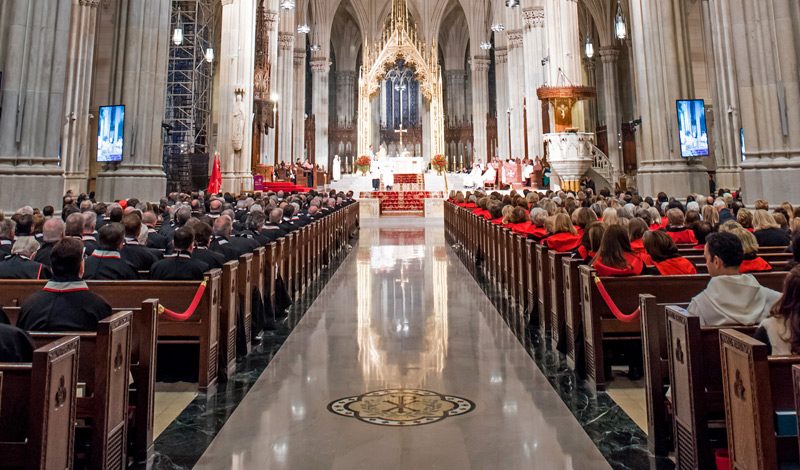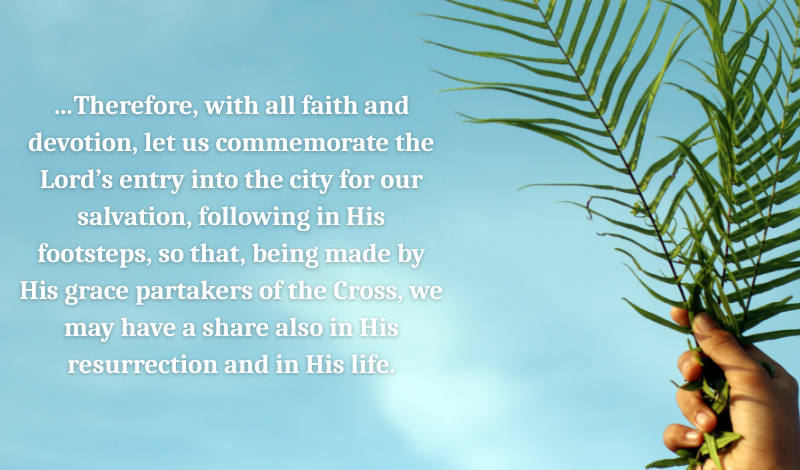This weekend we once again celebrate Palm Sunday, or, to give it the official title “Palm Sunday of the Passion of the Lord.” The liturgy and the readings are very rich and deeply moving. We have, for example two Gospel readings (both from Saint Luke who is our guide for this Year C of the three year cycle). The Gospel at the beginning of Mass (Luke 19: 28-40) recounts Jesus’ entrance to Jerusalem and the enthusiasm of the crowds who cry out “hosanna to the Son of David.” Then the long Gospel account of Jesus’ passion and crucifixion is read (Luke 22: 14-23: 56).
Both Gospels, all the readings and indeed the whole liturgy invite us to not simply to be passive spectators or simply to hear about these events that bring us salvation, but rather, as Jesus’ disciples, to enter fully into this “holy drama.” That is why we participate in the Masses and liturgies of Holy Week in a special and more dramatic way than usual: carrying palms or being the “crowd” in the reading of the Gospel. So, we are to be drawn into these life-changing (and world-changing) events. The introduction at the beginning of Mass today puts it so well:
…Therefore, with all faith and devotion, let us commemorate the Lord’s entry into the city for our salvation, following in His footsteps, so that, being made by His grace partakers of the Cross, we may have a share also in His resurrection and in His life.
Our First Reading (Isaiah 50: 4-7) is the third of the four “canticles of the suffering servant of God.” We will hear the other canticles during Holy Week, culminating on Good Friday. This suffering servant is, for Christians, a vision or prophecy about Jesus. He is that suffering servant who listens to God’s Word and obeys it, even to mockery and insult. Our psalm (Psalm 22: 8-9, 17-18, 19-20, 23-24) is also rather like a prophecy about Jesus and his suffering and there is that poignant line that Jesus speaks as he hangs upon the cross “my God, why have you abandoned me?” Our Second Reading is the enigmatic Philippians Hymn (Philippians 2: 6-11). Some scholars think that this passage was actually some form of hymn used in the very early Christian liturgy (an awesome thought!). It narrates a cycle or journey: Jesus as God who empties himself to become a slave, who then accepts death on a cross, only to be raised and to be given the name above every other name.
Then we hear (and also enter into) “The Passion of our Lord Jesus Christ according to Luke.” As mentioned, this year we have Luke’s account (as part of the three-year cycle of Matthew, Mark and Luke). There are many things in common with all three Gospel writers, as they tell us about Jesus’ suffering and death; but each of them also wants to bring out particular truths and reflections to help us. So, what does St. Luke wish to share with us…?
St. Luke’s Gospel is often called the “Gospel of Mercy.” It is only Luke, for example, who gives us those wonderful parables of the Prodigal Son or the Good Samaritan. During Jesus’ trial and suffering, St. Luke highlights many moments of compassion and forgiveness, as well as the universality of God’s Kingdom. Jesus heals the servant. Only in Luke’s Gospel does Jesus address Judas by name, perhaps as a last invitation for Judas to repent. Jesus forgives his executioners: they are acting through blindness and not malice. It should not surprise us then that only in Luke’s account of Jesus’ crucifixion do we have the wonderful encounter between Jesus and the repentant thief. In his last agonizing moments, at the 11th hour, the thief (by tradition called Dysmas) opens his heart and soul to Jesus and also shows his faith in Jesus. As Richard Neuhaus notes, in his wonderful book “Death on a Friday Afternoon”, it is the only time, in any Gospel, that someone addresses Jesus simply by his name “Jesus.” What is more, the repentant thief is the last person to speak to our Lord before he dies. He asks to be remembered by our Lord when he enters his kingdom. We have the amazing response and promise of Jesus: “today you will be with me in paradise.”
As St. Augustine stated so beautifully: “The repentant thief was the first person to declare publically that Jesus is king: not some theologian, or religious expert, or a holy person, or a rich person. No. A common thief! And by his repentance and simple prayer of needing Jesus, he committed one last act of robbery: he stole the Lord’s heart and so entered his Kingdom.” Yes, the universality of God’s reign and the fruits of our Lord’s passion, death and resurrection are already flowing out from the cross! It is never too late either to ask for and to receive mercy and forgiveness, or indeed to give it.
As we enter into this holy drama of Holy Week, may we all have a truly wonderful and holy Holy Week.
This reflection was written by the Very Rev. Msgr. Anthony M. Barratt, STL, PhD, EV, ChM.





